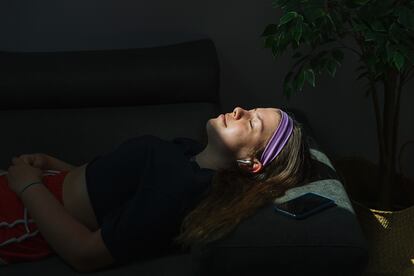Lullabies and K-pop are the preferred music for falling asleep
A study of 130,150 songs finds that slow instrumentals are good antidotes for insomnia, but surprisingly, so are some faster-paced tunes

When it’s time to turn off the lights and lay your head on the pillow, the mind often starts working overtime. Brains are not switches that can be turned on and off in an instant. Listening to music is one of the most popular strategies for calming brain activity and falling asleep quickly. But what’s the perfect music for this? It turns out that people choose all kinds of music when it comes to sleep.
A study by researchers at Aarhus University in Denmark, published in PLOS ONE, shows that there is a wide variety of musical preferences for falling asleep. By analyzing nearly 1,000 Spotify playlists (with 130,150 unique songs) that referenced the word “sleep” in various forms and languages, the researchers found a great deal of variety. While many of the songs are quiet and slow acoustic instrumentals, the Spotify playlists associated with sleep also include faster, louder and more energetic songs.
The song that appeared most often in the playlists (245 of the 985 playlists analyzed) was Dynamite by BTS, the Korean “K-pop” boy band. An upbeat song with a fast tempo, it doesn’t seem to fit the norm for relaxing music. Another popular song was Lovely by singer Billie Eilish (with Khalid), which appears on 60 playlists. Still, bedtime favorites and children’s lullabies such as Brahms’ Lullaby, Beethoven’s Moonlight Sonata and Twinkle Twinkle Little Star appeared more than 100 times in the playlists analyzed.
According to the study, even if a song is upbeat, it can induce relaxation and sleep in some people if it is familiar to them. The reason is that repeated listening enables the brain to anticipate what will come next, which produces an effect similar to that of a slow song without much variation.
Study co-author Kira Vibe Jespersen told EL PAÍS that there is still little scientific evidence to demonstrate how individual preferences and musical characteristics such as rhythm and volume affect sleep. “It’s probably some kind of mix, a balance of these factors. This study helps broaden our perspectives,” she said.
While the scope of the study didn’t analyze whether the songs improved sleep quality or actually helped listeners fall asleep faster, it demonstrated that the musical tastes for relaxation are highly individual and include a range of musical genres. Jespersen, who works at the Center for Music in the Brain in Denmark, said that the study results could optimize the clinical use of music by demonstrating the diversity of tastes. “It’s very important in clinical settings and scientific studies to take individual preferences into account.”
Alba García Aragón, a doctor specializing in sleep pathologies at the Sleep Institute, says that several studies have shown that patients who receive music therapy at night have significantly better sleep quality than control groups who did not listen to music. On the other hand, a 2020 study published by the Association For Psychological Science found that familiar and repetitive music, even if it seems relaxing, can trigger “involuntary musical imagery” that degrades sleep quality. “Given the lack of scientific evidence, more research is needed to confirm the efficacy of music therapy on sleep, and both the general population and people with sleep pathologies should be studied,” said García.
Nevertheless, García says that relaxing music can benefit adults who suffer from sleep disorders because of its physiological effects. Music can slow down the body’s rhythms and ultimately reduce sympathetic nervous system activity, as well as norepinephrine levels, both of which control physical alertness. These physical changes produce an increased sense of serenity and calm. “It reduces heart and breathing rates, lowers blood pressure, and relaxes muscles. For people under a lot of stress in their daily lives, music can help them sleep by shifting focus away from stressful thoughts and by blocking external noise,” said García.
Because of its physiological benefits, music may be one of the first recommendations a doctor makes for an adult with a sleep disorder. “Compared to pharmacological treatment, it’s an inexpensive, easily accessible measure that doesn’t cause addiction and has not been shown to have any harmful effects,” said García.
However, listening to a podcast may have an opposite, undesirable effect. While listening to stories can help you disconnect from stressful thoughts and focus on something else, it can also activate several areas of the brain responsible for sensory processing, emotions, and memory formation. “We would be giving contradictory messages to the brain,” said García. “You’re trying to prepare your body for sleep by lying in bed with your eyes closed, but your brain is trying to keep you awake so that you can listen to the podcast.”
Sign up for our weekly newsletter to get more English-language news coverage from EL PAÍS USA Edition
Tu suscripción se está usando en otro dispositivo
¿Quieres añadir otro usuario a tu suscripción?
Si continúas leyendo en este dispositivo, no se podrá leer en el otro.
FlechaTu suscripción se está usando en otro dispositivo y solo puedes acceder a EL PAÍS desde un dispositivo a la vez.
Si quieres compartir tu cuenta, cambia tu suscripción a la modalidad Premium, así podrás añadir otro usuario. Cada uno accederá con su propia cuenta de email, lo que os permitirá personalizar vuestra experiencia en EL PAÍS.
¿Tienes una suscripción de empresa? Accede aquí para contratar más cuentas.
En el caso de no saber quién está usando tu cuenta, te recomendamos cambiar tu contraseña aquí.
Si decides continuar compartiendo tu cuenta, este mensaje se mostrará en tu dispositivo y en el de la otra persona que está usando tu cuenta de forma indefinida, afectando a tu experiencia de lectura. Puedes consultar aquí los términos y condiciones de la suscripción digital.









































